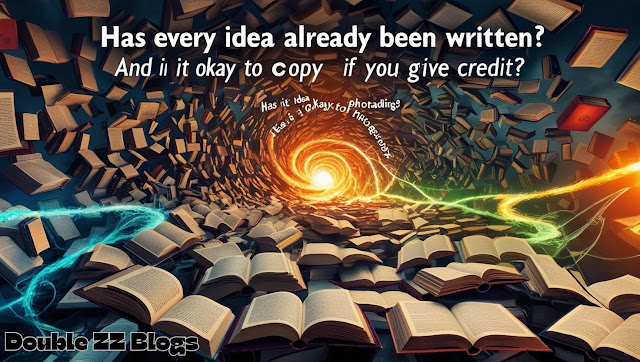India Upcoming Cricket Matches 2025 | Test Series, Asia Cup, and More

I am Double ZZ, I have work multiple tasks such as article writing, copywriting, biography, and more. You can buy attention (advertising). You can beg attention from the media (PR). You can bug people one at a time to get attention (sales). Or you can earn attention by creating something interesting and valuable and then publishing it online for free. My informal writing style is a political choice because I want feminism to be more accessible.

 |
| Double ZZ Blogs |
Every time I sit down to create something new—whether it’s a blog post, a YouTube script, or even just a tweet—this nagging thought creeps in:
And maybe you’ve felt the same.
It’s a fair question. We live in a world flooded with content. Millions of blog posts are published daily. Podcasts, TikToks, Reels, newsletters—it seems like every angle on every topic has already been covered. So naturally, it makes us wonder: Is originality even possible anymore? And if not, is it okay to copy as long as we give credit?
Let me break it down the way I understand it—and how I’ve come to peace with it.
Let’s be real: you’re not the first person to write about “how to stay motivated,” “why you should drink more water,” or “the secret to growing on YouTube.”
But that doesn’t mean the world doesn’t need your version of it.
Think about it—if we only ever needed one version of an idea, we’d have one motivational speaker, one book on fitness, and one stand-up comedian. Your own style of explanation, the examples you use, your own voice, the personal anecdotes from your own life—those are what matter.
They only have 12 notes on the Western scale, yet individuals create new songs daily. Magic is not in the notes—it is in the arrangement. It's somewhat similar to the music world. In the Western music scale, there are only 12 different notes, yet despite that, human beings continue to create and compose new songs every day without exception. The magic doesn't really happen in the notes—it happens in the creative combination of the notes.
Here’s the short answer:
You can quote someone. You can reference someone. But you can’t copy them outright—even if you credit them.
Because crediting someone doesn’t make it okay to steal their voice, structure, or full ideas. That’s not giving respect—it’s just lazy duplication with a side of guilt.
Let me provide a specific example.
Suppose that I write a personal essay on how to overcome self-doubt as a writer. You can absolutely write your own version of that idea. Maybe you even say something like:
“Reading another writer’s journey reminded me of my own struggle with imposter syndrome…”
Perfect. That’s respectful. That’s adding your voice.
But if you take my sentences word-for-word, or even structure your article just like mine with the same flow and examples, that crosses into plagiarism—even if you drop a “credit to [name]” at the bottom.
Here’s what I’ve learned that works (and still keeps my conscience clean):
I love reading what others have written. But when I get inspired, I close their article, open a blank doc, and ask:
“What do I have to say about this?”
That’s where your version lives. That’s where your originality starts.
Originality today is often about the remix. Take a popular idea—but add your own experience, your own angle, or combine it with something unexpected.
Instead of “How to Stay Focused,” try:
“How I Learned to Focus from Watching Gordon Ramsay Run a Kitchen”
Now you’ve got something familiar and fresh.
If you quote someone directly or pull stats from a study—yes, always give credit. Not only is it ethical, but it also builds trust with your audience.
But here’s the deal: quoting isn’t copying. It’s referencing. It’s a sprinkle, not the entire recipe.
No, not every idea needs to be 100% original. But your voice should be.
It’s okay to write about the same thing others have written about—as long as you say it in a way that’s true to you. That’s what people come for. That’s what builds a real connection.
And honestly? The world doesn’t need another carbon copy of someone else’s blog post.
It needs you, to show up with your own weird, honest, messy, smart take on things.
So yes—go write that post. Record that video. Share that message.
Even if it’s been “done before.” Because it hasn’t been done by you.
Comments
Post a Comment
Feel free to share Any Suggestions and Queries with your beautiful smile 🤗